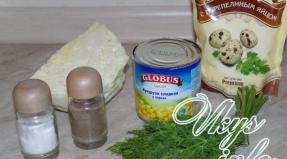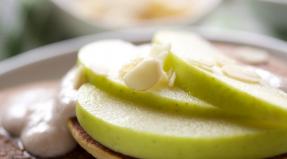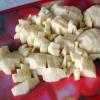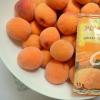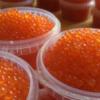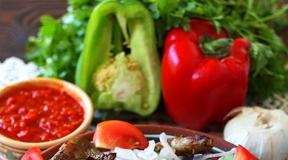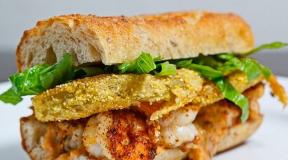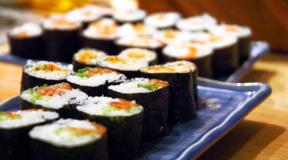Exotic mango fruit: health benefits and harms. The benefits of mango for the body and harm
Unusual fruit for our latitudes mango is gaining more and more popularity among domestic exotic lovers. Until recently, we knew about it by hearsay and saw it only in foreign films and in pictures in magazines, but now mango can be easily found in any supermarket and read about its benefits and possible harm to the body.
What is Mango?
Mango Is an exotic fruit native to East India. Gradually, the cultivation of mango trees spread to almost all subtropical countries: Asia, Africa, South and Central America, Madagascar. Recently, this overseas guest, who received the honorary status of "fruit king" in his homeland, has firmly settled on the shelves of domestic supermarkets. Fruits of different sizes, yellow, orange, red and greenish, attract the attention of buyers by their very appearance. And whoever tasted mango at least once and felt its rich, slightly tart sweet and sour taste will certainly decorate their diet with this truly royal product.
The fruits of the mango tree are oval and large, their average weight is from 200 g to 800 g. They come in a variety of colors: orange, green, purple and even black. The rind, smooth and shiny, is very easy to peel, and the flesh is yellow, juicy and sweet with a pronounced aroma. There is a bone inside the fruit, the length of which reaches 10 cm.
The color, size of the fruit itself and its bones depend on the varieties of mango, and there are about 1,500 of them, although only 35 species are suitable for food.
Chemical composition
Fruit mango are a rich source vitamins:(, E,) and minerals:(, calcium, magnesium, phosphorus, iron, copper, manganese, selenium, zinc). The pulp is composed of water and fiber, contains about 15% sugar and up to 1% protein. It contains beta-carotene, pectin, organic acids. The beneficial properties of this fruit can be both general and specific for different categories of the population. And also the fruit contains nonessential and essential amino acids and omega-3 fatty acids.
The nutritional value
100 grams of mango contains:
- Proteins: 0.8 g;
- Fat: 0.4 g;
- Carbohydrates: 13.5 g
- Dietary fiber: 1.6 g
- Water: 83.5 g.
Calorie content
100 g of product accounts for only 60 kcal.
General benefits of mango
The benefits of the mango tree are known for a long time, and, for medicinal purposes, flowers, bark, seeds and even gum (thick juice) from the bark are used, but its fruits are considered the main value of these trees. And, most interestingly, all the beneficial properties of the fruit are preserved in it, regardless of whether it is ripe or not yet ripe.
Mango fruit contains relatively little protein and almost no fat, but there is a huge amount of various vitamins and minerals, which is the reason for its popularity in folk medicine in many countries of the world.
In India, they successfully treated cholera and plague, and in the Philippines, ripe mangoes are prescribed as a laxative and diuretic, with their help you can stop internal bleeding, cure asthma and acute dermatitis. In Brazil, they claim that mango juice should be drunk with meals, to improve the absorption of meat and get rid of heartburn, and in Europe it is recommended to be taken as a preventive measure to strengthen the heart muscle. And also to normalize blood pressure.
Regular consumption of mango will help relieve nervous tension, reduce irritability, overcome stress and improve not only mood, but also sexual activity. Its pulp is used to treat scurvy, relieve inflammation of the gums, and reduce stomach pains. It has antipyretic properties, which means it helps in the treatment of colds. Strengthens the musculoskeletal system. The mango fruit effectively fights some types of cancer cells. It is useful for enhancing immunity.
Herbalists from different countries use a decoction of mango leaves in the treatment of diabetes, hypertension, varicose veins and inflammation of the pancreas.
Mango seed extracts have a beneficial effect on metabolic processes in the human body, are able to regulate cholesterol levels and help fight obesity.
Benefits for women
The peculiarity of the chemical composition (the presence of vitamins C, E, carotene, fiber, antioxidant substances) makes it possible to classify mango as products with antitumor activity. Women who regularly consume this fruit have a lower risk of breast and cervical cancer.
Eating the fruit helps prevent the development of anemia in women during menstruation. This property is due to the high iron content of the fruit.
The inclusion of mango in the diet will help the fairer sex to become slimmer and more attractive. The low calorie content of the product, combined with a mild diuretic and laxative effect, makes it possible to use the fruits in diets for weight control.
The benefits of mango on the condition of the skin and hair have been noted. The desired external effect can be achieved both with regular use of the fruit, and through the use of various cosmetics prepared on its basis.
Among other things, tropical fruits help to harmonize the intimate sphere of life, since they have the property of enhancing libido.

For men
The royal fruit is no less valuable for the strong half of humanity. Mango fruits are an effective remedy for the prevention of male diseases.
The active substances included in the composition are able to protect the urinary and reproductive systems of the body from various pathologies, to help prevent such an insidious disease as prostate cancer.
Thanks to the numerous minerals, reproductive function is improved. Vitamin E, when combined with beta-carotene, has a positive effect on sperm quality by protecting sperm from damage. With the systematic use of fruits, potency increases and, as a result, sexual activity increases.
In addition, a rich vitamin and mineral complex helps a man to always stay in shape, increasing his energy supply, endurance and performance.
Benefits of mango for pregnant women
Mango fruits, which contain a large amount of nutrients, are recommended to be included in the diet of women during pregnancy. The use of the fruit by the expectant mother will have a beneficial effect not only on her health, but also on the intrauterine development of the baby.
Iron-rich fruits can help prevent anemia in pregnant women. The fibrous structure of the mango will ensure the stable functioning of the gastrointestinal tract, contributing to the prevention of constipation.
A pleasant sweet and sour taste and vitamin B6 included in the composition will have a positive effect on a woman's well-being, reducing the severity and frequency of manifestations of such an unpleasant symptom as morning sickness. The magnesium contained in the fruit will help to avoid high blood pressure and, in combination with vitamin E, will prevent the development of late toxicosis.
In addition, the active components of mango contribute to the normalization of water balance and the prevention of edema. This property, important for pregnant women, is due to the presence of potassium in the fetus. But thanks to vitamin C, you can avoid such a big trouble as premature birth.
Mango is a valuable source of nutrients necessary for the harmonious growth of a baby in the womb. The tropical fruit contains a large amount of folic acid, which has a direct effect on the proper development of the brain and nervous system of the child. Vitamin B6 has a similar effect.
Of great importance for the formation of bones, teeth, eyesight and the baby's immune system is the presence of vitamin A in the mother's body, which can be obtained in sufficient quantities when eating exotic fruits. Vitamin C, which determines the antioxidant properties of the royal fruit, will also contribute to the full intrauterine development.

Benefits for children
Mango is a delicacy that is extremely beneficial for the growing body. It can be introduced into the children's diet from the first year of life, starting with one teaspoon of fruit puree. The product is not only easy to digest, but also helps to normalize digestion.
Vitamin B6 activates the brain, and glutamic acid, which is part of it, helps to improve memory and concentration. For the normal development of the organs of vision, the child's body needs an adequate supply of vitamin A, which is so rich in tropical fruits.
Vitamin C and beta-carotene strengthen children's immunity, helping the baby to cope with various infections. Mango juice is an excellent prophylactic agent that will protect a child from many diseases, and in the summer it will protect a small body from sunstroke and dehydration.
Harm and contraindications of mango
Mangoes, unlike many other exotic fruits, do not require any addiction to themselves, but, nevertheless, they should be consumed with some precautions.
In some cases, the consumption of exotic fruits can have negative consequences for the human body. You should be aware that the mango peel contains a toxic substance that, upon contact with the skin, can cause an inflammatory process. Gloves must be worn when peeling the fruit to avoid such damage. For people prone to allergies, eating royal fruits can cause unwanted reactions and thus be harmful to health.
In addition, the severity of side effects is directly related to the amount of product consumed. In case of overeating unpleasant phenomena such as diarrhea, irritation of the mucous membranes and even weight gain may occur. And finally the fruit cannot be combined with alcohol. The break between drinking mangoes and alcoholic beverages should be at least two hours.
Also, mango is prohibited for patients with diabetes, this is due to the content in it of a large amount of fructose, sucrose, maltose, etc.
From all of the above, one simple conclusion can be drawn: excesses are always bad. Therefore, in order to avoid unpleasant consequences, you should not eat more than two fruits at a time.
Mango for some diseases
Before eating exotic fruits, it is necessary, first of all, to assess the state of your health. In some cases, a tropical fruit should be treated with extreme caution so as not to exacerbate the existing ailment and deteriorate well-being. Impact mango on the body in the presence of specific diseases can be very ambiguous.

Benefits and harms of diabetes
Australian scientists have come to the conclusion that the fruit of the mango tree can serve as an effective preventive measure against diabetes mellitus. However, if the disease already occurs, the possibility of consuming the fruit should be correlated with the severity of the disease and, of course, a doctor should be consulted.
On the one hand, a balanced composition of mango can improve the patient's condition. As a rule, this is manifested in the general strengthening of the body, increasing immunity, activating metabolic processes, and restoring the internal microflora.
On the other hand, the fruit is loaded with sugars, which should be considered for any form of the disease. With mild to moderate diabetes, the amount of food consumed must be accurately calculated and strictly controlled. In case of severe form, mango fruits should be completely abandoned.
With pancreatitis
Overseas fruit is not recommended for people with pancreatitis. First of all, this applies to the acute phase of the disease. The high content of sugars predetermines an unbearable load on the inflamed pancreas. Of particular danger are immature fruits with pronounced choleretic properties, which affect the diseased organ in a destructive manner. During the period of stable remission, it is allowed to consume the fruit after consulting a doctor in strictly limited quantities.
With gastritis
For people suffering from gastritis, mango is by no means a dietary product. The fatty acids in the composition, which are beneficial for a healthy body, can worsen the condition of a patient with gastrointestinal problems. Therefore, in the acute period of the disease, the use of fruits should be completely excluded.
In the chronic form, the amount of fruit consumed should be limited due to the possible exacerbation of the disease. This is especially true for patients suffering from gastritis against a background of high acidity.
The benefits of mango for weight loss
It turns out that overseas fruits can be used not only to decorate the table, but also as an effective means to combat extra pounds. Weight loss in this case is due to the following factors:
- When eating mangoes, the production of a special hormone, leptin, is activated, which regulates the process of fat accumulation in the body.
- Under the influence of active substances, an enhanced breakdown of fats occurs, followed by their excretion.
- B vitamins help the liver to process and eliminate carbohydrates.
- The substances that make up the fruit convert fats into energy and thereby contribute to the intense burning of calories.
- The potassium present in mango helps in the elimination of excess fluid.
- Plant fibers and pectin improve digestive processes and normalize metabolism.
- Due to the abundance of water and fiber, the fruits fully saturate the body and suppress appetite.
Low calorie content allows you to meet the body's need for vital components without fear of excess weight.
Dried mango
To obtain dried mango, only ripe fruits are harvested. After cleaning, they are cut into pieces and moisture is removed in special dryers. Some growers, in the next step, coat the already dried mango fruit with a thin layer of oil. Usually it is a raw material made from rice bran. This process is necessary for better storage of the fruit and the long-term preservation of all nutrients.
It is worth noting that dried mango has almost all the benefits for the body, as fresh. The only thing is that such a product is more high-calorie. There are 325 kcal per 100 g of dried mango fruits.
Simple and healthy mango recipes
Mango is usually eaten fresh, but it is great for desserts, salads, sauces and as a side dish for meat, and its juicy pulp makes excellent refreshing drinks.
Ingredients:
- mango - 4 pcs;
- cream - 200 g;
- sugar - half a cup.;
- lemon zest - 2 tbsp. l .;
- condensed milk - 0.5 cups;
- salt.
How to cook:
Peel the mango, cut it, place it in a blender, whisk and transfer to a saucepan. Whisk the cream and sugar in a blender until a firm foam is obtained. Add zest, condensed milk, milk and a pinch of salt to the mango puree, mix well and carefully add the whipped cream. You should get an air mixture, which must be placed in the freezer for 6 hours, and taken out only before serving.
Ingredients:
- mango - 3 pcs.;
- lemon - 1 pc.;
- sugar - 100 g;
- mineral water - 2 liters;
- mint - a bunch.
How to cook:
Finely chop the mint, squeeze the juice out of the lemon, add sugar and, cut with wire cutters, mangoes, mix everything well in a blender. The resulting puree can be stored in the refrigerator for up to 7 days and, if necessary, add a few tablespoons to a glass of cold mineral water.
Ingredients:
- a glass of flour;
- 100 g butter;
- 5 pieces. eggs;
- half a mango fruit;
- sugar - 150 g;
- honey - 4 tsp;
- cream - 125 g;
- salt on the tip of a knife.
Cooking process:
Use a blender to beat flour, butter, 1 egg and salt. Place the resulting dough in a baking dish and place in the freezer for an hour.
Peel, cut, add sugar and grind the mango in a blender. Add honey and 4 eggs to this mass, beat again.
Remove the crust from the freezer, put it in the oven and bake for about 10 minutes. Add cream to the fruit mixture, pour it over the pie and into the oven for another half hour. Serve the pie only cold.
Mango is a wonderful, exotic fruit and its regular, but moderate consumption, not only diversifies your menu, but also supplements the body with the necessary substances and vitamins, thereby making it healthy.
Vote
Mango for health

Benefit or harm?
Mango - benefits and harms to the human body
What is Mango?
Mango is an oval, juicy tropical stone fruit that has a distinctive outer meaty portion that surrounds a seed with a seed inside. Coconuts, cherries, plums, apricots, and also stone fruits.
Mango fruits grow on a large evergreen that grows almost exclusively in the tropics and subtropics. It can be in a variety of shades, ranging from green to red or yellow to orange, but the inner flesh is usually golden yellow in color. The flavor is often described as a cross between peach and pineapple.
Mango seeds traveled with people from Asia to the Middle East, East Africa and South America around 300 or 400 AD and were first grown in Malaysia, East Asia, and East Africa.
The popularity of this tropical fruit has grown and grown, so that today it has the honor to be called one of the most widely consumed fruits in the world.
Interesting fact: In India, if you give someone a basket of mangoes, it will be considered an act of friendship.
Nutritional value, composition and calorie content of mango
- Caloric content: 65 kcal (3%).
- Carbohydrates: 17 g (6%)
- Fat: 0.3 g (0%).
- Protein: 0.5 g (1%).
- Fiber: 1.8 g (7% DV)
- : 765 IU (15%).
- Vitamin C: 27.7 (46%)
- Vitamin E: 1.1 mg (6%)
- Vitamin K: 4.2 mcg (5% DV)
- Thiamine: 0.1 mg (4%).
- Vitamin B6: 0.1 mg (7%).
- Potassium: 156 mg (4% DV)
- Copper: 0.1 mg (6%).
- : 37 mg.
- : 14 mg.
Mango also contains small amounts of riboflavin, niacin, folic acid, pantothenic acid, calcium, iron, magnesium, phosphorus, and antioxidants such as zeaxanthin, quercetin and astragalin.
The benefits of mango for the human body
Below we highlight 11 of the main health benefits of mango, giving you at least many reasons why you should diversify your diet with this fruit. Here's what mangoes are good for:
1.Reduces blood sugar
Scientists found that mango consumption was associated with lower blood sugar levels in obese adults (). While consuming this fruit regularly did not lead to weight loss, it did have a positive effect on their blood glucose levels. Meanwhile, other studies indicate that eating this fruit improves blood sugar control as well as glycemic control ().
2. Reduces high blood pressure
Because mango is both potassium-rich and virtually sodium-free, eating it regularly is another natural way to lower blood pressure. Dubbed the "silent killer," high blood pressure affects about 1 in 3 adults in developed countries, while only about half of them control their blood pressure ().
3. Improves brain health
Mango is a good food for the brain as it contains what is needed to maintain and improve brain function. Vitamin B6 and others are critical for maintaining healthy brain neurotransmitters and also help maintain healthy mood and sleep ().
4. Possible protection against age-related macular degeneration
Mango contains the antioxidant zeaxanthin. Zeaxanthin filters out harmful blue light rays, thereby playing a protective role in eye health and possibly protecting against age-related macular degeneration, which is the leading cause of vision loss in developed countries (). Age-related macular degeneration destroys the macula, the part of the eye that provides clear central vision.
5. Improves bone health
Mango contains good levels of the bone-healthy vitamin K. Vitamin K deficiency is associated with a higher risk of bone fractures. Vitamin K is also important for proper absorption of calcium, which is essential for healthy bones and teeth. And remember, the mango tree also provides the body with calcium, which is the main nutrient found in bones ().
6. Reducing the risk of cardiovascular disease
Mango is high in pectin, a soluble fiber that can help. Plus, this fruit is virtually sodium-free and high in potassium and B vitamins, which together may help reduce the risk of heart disease. Heart disease is also one of the leading causes of death in both women and men living in developed countries ().
7. Helps Fight Cancer
As mentioned earlier, mangoes are high in pectin, which not only helps lower blood cholesterol levels, but may also protect against prostate cancer (). The compound in pectin binds to galectin-3 and blocks its activity. Galectin-3 is a protein that plays a significant role in the development of cancerous tumors at all stages of cancer.
In addition, the high beta-carotene content of this fruit may help protect against prostate cancer. Eating this fruit may also be beneficial in fighting breast cancer (). While research is still in its early stages, consuming these fruits may be a useful part of a cancer treatment protocol.
8. Slows down the aging of the body
No one wants to show the signs of aging (especially after reaching a certain age) and mango can help slow down the natural aging process thanks to its high amount of vitamins A and C, which help to produce collagen proteins in the body. Collagen is known to help slow down the natural aging process of the skin by protecting the blood vessels and connective tissue of the body ().
9. Increases immunity
Your immune system is your body's first line of defense against disease-causing pathogens, and it does everything to keep your body healthy. As we said, the mango fruit is rich in beta-carotene and, which also help to strengthen the immune system. Once in your body, beta-carotene is converted into vitamin A, which helps you fight free radicals that can damage your body and impair your health.
10. Helps eliminate constipation
Medium-sized mangoes supply about 20% of the RDA for fiber (dietary fiber). Getting enough fiber from food helps your digestive tract work more efficiently, preventing constipation and helping to treat pre-existing problems with bowel movements.
11. Reduces the risk of developing asthma
People who consume certain nutrients, such as beta-carotene, can lower their risk of asthma. As you remember, mango contains a significant amount of beta-carotene, thanks to which the use of this fruit helps prevent asthma. Asthma results from inflammation in the air passages, which temporarily narrows the airways that carry air from the nose and mouth to the lungs and back out, resulting in shortness of breath, shortness of breath, coughing, chest tightness, or even death.
Mango history and interesting facts
Mango originates in South and Southeast Asia and is one of the most cultivated fruits in tropical countries. Mango is the only mango tree that is commonly grown in several tropical and subtropical regions. Historical records show that mango trees were cultivated for their delicious fruit in what is now eastern India, Pakistan and Burma 4,000 to 5,000 years ago.
In southern North America and Hawaii, mango appeared and began to be cultivated around 1880.
As the national fruit of India, Pakistan and the Philippines, and the national tree of Bangladesh, the mango fruit and its leaves are used ritually to decorate religious ceremonies, public holidays and celebrations, as well as weddings. It should come as no surprise that many stories of Indian mythology mention mangoes. In fact, Buddha is said to have meditated in a mango grove under the shade of a mango tree.
India holds the title of the world's largest mango producer with over 1000 varieties, although China, Mexico, Brazil and Thailand are also major producers. Florida is the main producer of this fruit in the USA.
Not only is the mango interesting because the tree is long-lived and the fruit is very popular, but it also has some unusual relatives. Did you know that mango fruits belong to the same family as and? This is true.
Mango trees can reach very high heights - from 20 to 30 meters in height. They can also live for long periods of time. In fact, some trees are over 300 years old and still bear fruit.

How to choose and use mango
When choosing a mango, take the fruit in your hand and lightly press on it with your fingers. Due to the pressure, small dents should appear on the surface of the fruit. This means that the fruit is ripe and ready to eat.
If the fruit is not fully ripe, place it in a paper bag and leave it in a warm place. It will mature within two days. However, you can also store unripe fruits at room temperature, in which case it will take about a week to ripen. When stored in the refrigerator, it will mature in about two weeks.
There are many ways to consume mango, but perhaps one of the best is to eat it fresh without adding anything else.
Here are the most common ways to consume these fruits:
- You can cut the fruit into cubes and consume it neat.
- You can also add it to other similar fruits, including fresh pineapple and a delicious tropical fruit salad.
- Mango is also great for making smoothies.

Mango salad and lettuce
Mango harm to the human body
Despite its many health benefits, these exotic fruits can also be dangerous for some people. This is what mangoes are bad for:
- Since pistachios and cashews belong to the same family as mangoes, if you are allergic to pistachios or cashews, then you should probably avoid consuming the fruit of the mango tree.
- In addition, mango trees are also a very distant relative of poison ivy, so some people may have a sensitivity to its fruit.
- Some people with latex allergies can also cross-react to mango fruits, so be careful if you have this type of allergic reaction.
- Mango also contains tiny amounts of urushiol, which can cause dermatitis in sensitive individuals. Finally, if your kidneys are not functioning well enough, excess potassium intake (mango fruit contains potassium) can be dangerous, if not fatal, as it can be difficult for these kidneys to remove excess potassium from the bloodstream.
Calories, kcal:
Proteins, g:
Carbohydrates, g:
The Indian province of Assam is famous not only for the tea of the same name, but also this area is considered the birthplace of mango - "king of fruits", a delicious fruit of Indian mango ( Mangifera indica) belonging to the family Anakardievs... It grows in tropical and subtropical climates, the fruits are oval, heavy, large in size. The color of the mango peel - yellow, red-green, green, brown-green, red and even almost black - depends on the type of fruit, of which there are more than 300 (calorizator). The pulp of the fruit is juicy, dense, bright orange or dark yellow in color, with long fibers, which are sometimes quite firm. The taste of mango is sweet, with a slight sourness, the aroma is strong, fruity. The fruit has a large hairy bone, which is difficult to separate from the pulp.
Calorie content of mango
The calorie content of mango is 67 kcal per 100 grams of product.
Composition and useful properties of mango
The product contains:, vitamins (,), as well as the necessary minerals:,. Mango is rich in fiber and. Sucrose, organic acids and mangosteen put mangoes in a number of beneficial foods that strengthen the body's defenses and are powerful antioxidants. Mango has antipyretic properties, helps prevent the onset and development of malignant tumors, especially in the pelvic organs and the genitourinary system. Mango can be considered a natural antidepressant, because the fruit helps relieve nervous tension, relieve stress and improve mood, and mango is a recognized aphrodisiac that acts on partners of both sexes.
Mango harm
Mango is a fairly strong allergen, and sometimes allergic reactions occur when the skin comes in contact with the skin of the fetus, so gloves used when peeling a mango will save the situation. Unripe fruits, eaten in large quantities, cause indigestion and severe colic. Excessive consumption of ripe fruits is fraught with constipation and fever.
Special devices for cleaning mangoes have appeared on sale, but if you don't have such a “gadget” in your arsenal, you shouldn't be upset. Ripe mango is quite problematic to peel, so we peel it in the same way as - cut it on both sides along the length, trying to cut it to the bone, then take the fruit in both hands (each hand has its own half of the mango) and turn the halves in a crosswise motion (calorizer ). One can be easily separated, and from the second, using a sharp knife with a small blade, we extract the bone.

If the mango has a dense peel, you can carefully cut it off with a sharp knife and cut the pulp into slices, so it will be easier to remove the bone.
Mango in weight loss
With a minimum of calories and protein, mango becomes a desirable product for those who are going to lose those extra pounds. But without proteins there will be no energy and strength, so the best companion for mango is rich in protein. By combining just two products, you can lose a couple of kilograms in a few days without harm to health and appearance. Milk can be washed down with pieces of fruit, or whipped into a nutritional mixture - smoothies.
Selecting and storing mangoes
On the shelves of shops there is an abundance of exotic fruits, mangoes can be bought throughout the year. To please yourself with delicious and ripe fruit, you need to know a few simple rules. First you need to take the mango in your hands, check the smoothness of the skin (you can see the shine without touching the fruit) and elasticity when pressed. The color of the peel is not a sign of ripeness, but an indication of belonging to a certain variety, so even a dark green mango can be ripe and juicy. One of the main signs of the "readiness" of the fruit is its smell, which you need to feel at the stalk - strong fruity, without acidity, sometimes slightly coniferous or even turpentine (this is normal). and they cook compotes from them.
For more information about mango, see the video clip of the TV show "About the most important thing."
Specially for
Copying of this article in whole or in part is prohibited.
Summary of the article
Mango is a tropical fruit with a mild and sweet taste, juicy and fibrous pulp. The skin color is green with red spots, with the redness being determined by how ripe the fruit is. An evergreen plant belonging to the Sumach family, it grows in the tropical forests of India.
Rich in vitamins, trace elements and nutrients, the fruit is useful both fresh and in the form of candied fruit. The product strengthens the immune system, has a positive effect on the functioning of the digestive organs and nerve fibers, tones the body.
Mango stimulates the restoration of cellular structures, inhibits aging, therefore it is a common component of anti-aging cosmetics and medicines for skin healing.
Chemical composition and nutritional value of tropical fruit
The benefits of mango for the human body are due to the inclusion of a large number of useful elements in the product. Many compounds found in the pulp of a tropical fruit are vital to humans.
Of the vitamins in the pulp, retinol, ascorbic acid, tocopherol, group B are present. Of the minerals, the fruit contains magnesium, calcium, potassium, zinc, iron, selenium, phosphorus. Also, the fruit is rich in flavonoids, starch, organic acids. You need to know that unripe pulp contains more polysaccharides, acids and starch than ripe pulp.
100 grams of the product contains about 70 kcal, contains:
- proteins - 0.5 grams;
- fat - 0.4 grams;
- carbohydrates - 14.8 grams;
- fiber - 1.6 grams;
- ash elements - 0.5 grams;
- water - 82.2 grams.
ADDITIONAL INFORMATION! Mango is a product with an average glycemic index.
The benefits of mango for the human body

The exotic fruit, saturated with vitamins and minerals, has a positive effect on the state of many organs and systems.
1. Mango contains a large number of various plant sugars necessary for people who are engaged in hard physical work or mentally overstrained.
2. Pulp is a good source of nutrients and vitamins that are important for the normal functioning of the organs of vision. Therefore, it is useful to include the fruit in the diet for people suffering from eye pathologies.
3. The product is rich in ascorbic acid and B vitamins - substances that are powerful antioxidants. These vitamins are necessary to strengthen the immune system, to form a reliable defense of the body against negative factors.
4. Calcium, iron and other minerals present in the fruit ensure the proper functioning of nerve fibers, muscles, and the digestive tract.
5. With the regular inclusion of ripe fruit in the diet, the likelihood of developing oncological and infectious diseases decreases, and immunity is stimulated.
6. Mango pulp contains substances that stop bleeding, strengthen muscle tissue, and increase the efficiency of the brain.
7. An unripe fruit is a good remedy for cleansing the digestive system from poisons.
IMPORTANT! Mango is not only healthy, but also a dietary product. It has a low calorie content, therefore it is used in weight loss diets. The fruit saturates the body with vitamins and minerals, but does not increase body weight.
Benefits for the immune system
The tropical fruit is a good remedy for strengthening the immune system. The fruit is rich in vitamin C, a powerful antioxidant. Therefore, it is useful to use mango for vitamin deficiency, infectious pathologies of the teeth and mouth, acute respiratory diseases.
The substances that make up the pulp effectively eliminate cold symptoms, lower fever, and restore the body's defenses.
The benefits of the fruit for the genitourinary system
Mango is recommended for people suffering from pathologies of the urinary system and genitals. With the regular inclusion of the fruit in the diet, the likelihood of developing kidney disease decreases. The substances that make up the pulp prevent the appearance of urolithiasis and malignant tumors in the kidney tissue.
Benefits for the nervous system
The tropical fruit is very beneficial for the nervous system. Its pulp contains a significant amount of B vitamins, which help to overcome chronic fatigue, eliminating the effects of stress.
Regularly including mangoes in the diet, you can get rid of certain nervous pathologies, improve the emotional state, and increase libido.
Benefits for the digestive tract
The fiber-rich tropical fruit has a beneficial effect on the functioning of the digestive organs. An unripe fruit can be used as a remedy for diarrhea, hemorrhoids and other pathologies of the intestinal tract.
Mango pulp is good at eliminating the symptoms of dysentery, and fiber cleans the digestive tract of toxins and toxic compounds.
The benefits of mango for vision
Mango contains a high concentration of vitamin A, which is essential for the proper functioning of the optic nerves. By consuming the fruit regularly, you can strengthen the cornea, slow down or stop the development of certain eye pathologies. Also, a tropical fruit is a good remedy for the prevention of drying out of the cornea, eye strain, night blindness.
Benefits for the heart and blood vessels
The pulp contains substances that normalize the concentration of sugar in the blood. Mango is recommended to be included in the dietary menu for diabetes and atherosclerosis. When eating the fruit, the amount of harmful cholesterol in the blood decreases, the hormonal background is restored.
Mango in the form of candied fruit has a positive effect on the work of the heart muscle and circulatory system, normalizes blood pressure. Candied mango is a good way to improve the performance of the brain, improve hearing, normalize sleep, and prevent anemia.
Mango in diet food
The exotic fruit is recommended to be included in the diet for people seeking to lose weight. Mango is one of the foods that burn fat intensively, therefore it is often included in weight loss diets. The fruit is low in calories and can be used as a substitute for sweets, cakes, cookies and other unhealthy sweets based on fast carbohydrates.
Use in cosmetology
Today, the tropical fruit is widely used in cosmetology. Cosmetics based on mango extract effectively deal with various skin problems. The substances found in the mango extract inhibit the aging process of the skin, cleanse the pores, make the face fresh and taut, and quench inflammatory reactions.
Creams containing mango actively tone up the skin, smooth cracks and fine wrinkles.
Currently, shampoos, cleansers, and shower gels based on mango extract are gaining popularity. Mango seed oil is actively used in cosmetology. It is recommended for the restoration of hair structure, gentle care for the skin of the face, hands and body.
The oil can protect the skin from the negative effects of ultraviolet radiation, lighten age spots.
Benefits for pregnant women
The fruit is extremely beneficial for the body of pregnant women. It contains a large amount of folic acid, which is necessary for the correct formation of the nerve fibers of the embryo, maintaining the normal mental and emotional state of the expectant mother.
In a pregnant woman who includes mango in her diet, the likelihood of toxicosis decreases, blood pressure normalizes, emotional fluctuations are absent, and the work of the heart, kidneys, and urinary system remains at an optimal level.
The fruit helps to remove excess fluid from the body, thereby reducing swelling in a pregnant woman. Also, the product has a mild laxative effect, which is important for expectant mothers suffering from constipation.
IMPORTANT! But you need to know that it is forbidden to give mangoes to babies as complementary foods. An exotic fruit can cause an allergic reaction or colic in a baby. The fruit is allowed to be included in the diet of a child who has reached 3 years of age.
Choosing a quality fruit
It is not difficult to choose a ripe and high-quality fruit in the store, you just need to pay attention to a few nuances.
- You should sniff the fruit at the stalk. The scent should be mild, slightly reminiscent of the scent of a peach. If the smell is sour or alcoholic, then the fruit is overripe, begins to ferment or rot.
- A quality fruit has a dense and smooth skin. If, when pressed, the skin bursts and exudes juice, and a dent remains on the surface of the fruit, then the product is stale.
- When choosing a mango, it should be borne in mind that the product is of a dessert and sauce type. Each type has its own specific taste. Therefore, when buying a fruit, you need to carefully read the information on the price tag.

Mango harm to the human body
The fruit is undoubtedly good for the human body. However, there are contraindications to eating mangoes. The harmful part of the fruit is the peel, it can provoke an allergic reaction. Therefore, people prone to allergies are advised to wear rubber gloves on their hands before peeling the fruit.
Unripe fruit can harm the body. It irritates the throat and causes disturbances in the digestive tract. But even a mature product should not be consumed in excess, otherwise constipation will have to be treated. It is permissible to eat no more than two fruits per day.
IMPORTANT! You should be aware that mango should not be consumed in conjunction with any alcoholic beverages.
The benefits and harms of candied mango
Candied fruit contains a small amount of organic acids that irritate the mucous membranes of the digestive tract. Therefore, people suffering from gastritis and peptic ulcer disease are advised to consume mango not fresh, but dried.
It should be borne in mind that candied fruits are covered with sugar syrup, therefore they are high in calories. 100 grams of dried fruit contains about 320 kcal. Therefore, candied mango should not be included in the diet of people suffering from obesity and diabetes.
Methods for preparing and eating mango
Usually, mango is eaten like all fruits, without being cooked. However, the sweet and juicy fruit can be a great ingredient in salads and desserts.

Many people who decide to try mango for the first time do not know how to peel and eat a mango. Peeling the skin from the pulp is a simple matter, and it can be done in several ways.
- The fruit is placed on a plate. The pulp is cut from both sides of the fruit as close to the bone as possible. The cut parts are placed with the pulp up, a grate is carefully cut out on them with a knife. A piece of fruit is turned inside out, each cube of the lattice is cut from the skin. The pulp remaining near the stone is also separated from the peel and cut into cubes.
- The fruit is visually divided transversely into three equal parts. With a knife, the skin is cut shallowly at the level of one third. The remaining two thirds are cut longitudinally along the center line. To peel off the skin, you need to pull the corners of both longitudinal thirds. The peeled pulp is eaten. Then, holding the fruit by the stone, you need to remove the skin from the remaining transverse third. The pulp is eaten up.
You can cut the skin off an unripe fruit with a well-sharpened knife or a potato peeler.
If the fruit is peeled in the first way, then the cubes can be taken with your fingers, a fork or a skewer. It should be borne in mind that ripe mango pulp secretes a lot of juice, therefore, while savoring juicy fruit, care must be taken not to stain clothes.
If the fruit is very soft and rich in juice, then you can simply cut it into two parts, and scrape each part out of the peel with a spoon.
You May Also Like
 Continuing the review of exotic fruits, one cannot but tell about such an excellent representative of this category as mango.
Continuing the review of exotic fruits, one cannot but tell about such an excellent representative of this category as mango.
India is considered the birthplace of mango or mangifera, it is from there that fragrant fruits end up on domestic counters today.
Mangifers are no longer a rarity, they can be bought all year round, they are always found in large supermarkets and markets, although the price of fruits is higher than average, expensive delivery and other overhead costs affect.
However, despite the high cost, mangoes are worth buying at least from time to time. This is not only very tasty, but also a healthy tropical fruit, which neither adults nor children will refuse to eat.
For those who have never eaten mangoes
If you have never tasted mango, then try to correct this omission as soon as possible, because mango is an amazing fruit.
In size, it is like a large orange, only it has an oval shape and a smooth shiny peel, the color of which can vary from green to yellow and from yellow to red, and within the same fruit.
Depending on the country of growth, mangoes differ in appearance and taste. Today, in addition to Indian mangifers, you can find Spanish, Mexican, Pakistani, Egyptian, Thai, and also Israeli. 
The pulp of all ripe mangoes is pleasantly fibrous, very juicy, sweet, but not cloying, aromatic. There is a small flat bone inside the fetus.
- Spanish mango They are usually orange or red in color, they are smaller than others and have a noticeable sour taste.
- Thai mango- whitish, very large and very juicy.
- Pakistani mango- green, with a thick dense skin.
As already clear, it is impossible to determine the degree of ripeness of mango by the color of the peel - they are all multi-colored. To buy a good ripe fruit, you need to pay attention to the stalk.
If it comes off easily, then the mango is ripe. If there is no stalk, then the indicator will be the aroma, which is most intensely felt exactly in the place where the stalk was attached.
A strong, pleasant smell, elastic, shiny peel - these are the signs that indicate the ripeness of a mango. But if you come across a greenish fruit, do not be discouraged, put it in a dark kitchen cabinet, for about a week - it can "reach".
In the refrigerator, mango will never mature, because at low temperatures, the ripening processes in it completely stop.
The field of application of mango is very wide and it is not only cooking. Mango is a medicinal fruit, it is also actively used in cosmetology and dietetics.
Chemical composition of mango
The flesh of the mango is bright yellow, like a pumpkin, which indicates the presence of a large amount of carotenoids in it (about 5 times more than in any other orange fruit).
Mango is tasty and low in calories - only 65 kilocalories- a godsend for those who follow a diet.
Mangifera contains a huge amount of various sugars (xylose, maltose, sucrose, fructose, sedoheptulose, mannoheptulose, etc.), vitamins (especially vitamins C and B), mineral components (iron, sodium, calcium, magnesium, potassium, phosphorus, etc.). ).
It also contains many essential amino acids required by the human body.
The richness of the chemical composition of mango is comparable to such "well-deserved" fruits as pomegranate and apples.
The healing properties of mango were first discovered by ancient Indian healers, and in Pakistan the fruits are still used primarily for healing many ailments, and only then, as a delicacy.
What are the benefits of mango for the body?
1. The fruit improves vision, prevents its deterioration. Helps with "night blindness", astigmatism, myopia.
2. Mango helps to cope with nervous disorders, increased emotionality, depression, anxiety and their consequences, such as headaches, sleep disturbances and others.
3. It is used to normalize the reproductive functions of the male and female body.
4. Equalizes hormonal levels, enhances sexual desire.
5. Strengthens the immune system, reduces the risk of contracting viruses, infections.
6. Actively fights cancer cells during their inception and active growth, so everyone should eat mango for the prevention of oncology.
7. Mango helps to rejuvenate the body, reduces general intoxication, prevents cellular oxidation.
8. The presence of a large amount of fiber in mango stimulates intestinal motility. The fruit relieves constipation and slagging.
9. Possesses hemostatic properties.
10. Reduces the appearance of dermatitis, prevents and treats acne.
 11. Mango is great for heartburn.
11. Mango is great for heartburn.
12. Has diuretic properties. Used as a decongestant.
13. Mango increases hemoglobin.
14. Calms the heartbeat and relieves pain in the region of the heart.
15. Considered one of the best fruits to use in weight loss diets.
To get the most out of the mango, connoisseurs advise to chew the pieces of fruit slowly and leave the pulp in your mouth for as long as possible. By eating mango in this way, a person strengthens the heart and blood vessels.
Mango - harm
Mangoes cannot be eaten in large quantities at once. Like any bioactive product, it can provoke a back reaction and, instead of the expected benefit, bring only harm:
allergies;
stomach cramps;
irritation of the mucous membranes;
diarrhea or constipation;
indigestion.
Be healthy.
Read also ...
- Chicken liver pate
- Delicious zucchini with cheese in sour cream in the oven - a step by step recipe with video Zucchini recipes in the oven with sour cream
- Banana rice and corn flour pancakes (gluten free) with homemade banana sauce Banana pancakes with semolina
- Cabbage casserole with chicken Chicken fillet casserole with cabbage



